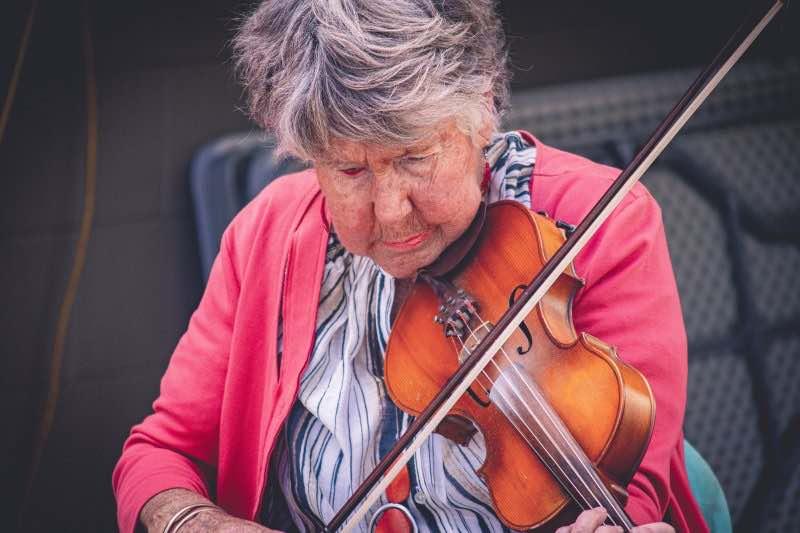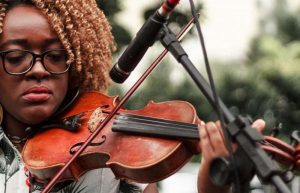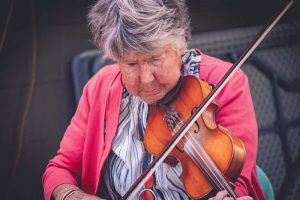Have you ever thought of taking up the violin but thought, “No, I’m just too old.” Well, I was recently approached by a woman who, at the age of 67, had decided to finally realize her ambition of playing the violin. I had no hesitation in offering to teach her, but I did wonder how she would progress. The good news is that much can be accomplished even by a more mature beginner.
I was fortunate to be born into a musical family, and my father started me on the violin when I was just three years old. Any teacher will tell you it’s better to start young, however, age is no barrier.
First of all, it is important to establish your goals. If you have visions of performing the Brahms violin concerto at Carnegie Hall with the Royal Philharmonic Orchestra, then perhaps we need to reassess what can realistically be achieved. For many, the goal will simply be to make music and have fun. This can be achieved at home on your own, or perhaps you have the desire to be part of a local community orchestra.
Having spent my entire life playing in symphony orchestras, I know from personal experience just how deeply satisfying an exhilarating performance of, say, a Tchaikovsky symphony can be; especially when surrounded on stage by friends and colleagues all enjoying the experience and family cheering you on in the audience.
How to Know You’ve Found a Good Teacher
If you have now mustered up the courage to learn to play the violin, the next obvious step is finding a teacher. At this point you may not even own a violin yet. A good teacher will be able to advise you on either purchasing one or renting. I usually advise renting as purchasing even a beginners violin can cost several hundred dollars and renting can be as little as about $25 per month.
What should you look for in a good teacher? For the more mature beginner it is important to find a teacher with experience teaching late starters. It is, unfortunately, a fact of life that physical skills are harder to learn for adults than for children. The teacher needs to understand this and have patience. Children are very much a blank canvass to work on, especially when it comes to muscle memory. This is something I referred to in a previous blog about practice tips.
There Are Benefits to Learning as an Adult
Adults on the other hand have muscle memory that they may need to unlearn in order to hold a violin and bow with good posture. The good news, however, is that studies have shown that adults can learn to read music quicker than children and can often be more motivated. Regardless of age, your body will need to adjust to the complexities of holding the instrument. Complaints about sore necks, arms, and even fingertips are quite common. Don’t despair! The body will adjust in time.
It’s Important to the Have Discipline to Practice
If you are now embarking on this journey as a more mature beginner you are likely to be keen and excited, and the motivation will be high. However, if you are like my new 67 year old student, you are unlikely to have a parent at home encouraging you to practice.
I remember very well as a child being sent to the music room to practice when I really wanted to skip it that day. As an adult, you can skip it any time you like but really, you must have the discipline to practice every day.
Take a look at your daily schedule and find time to include your violin practice. First of all, find the right time of day to practice. I understand, of course, that many of you will have other commitments, so finding the time may be determined by other factors. It is, however, important to dedicate a set time (time blocking if you like) and clear your mind to focus fully on the violin. Try to find a place that is free from other distractions like television or cell phones! Only with regular daily practice will you reap the benefits.
Rise Above the Frustration, & Focus on the Process
There will, inevitably, be frustrating days. Some days you will think there is no improvement and you’ll ask yourself “is it really worth it?” You may have been practicing your bow hold for hours, and still not quite getting it. There will be struggles, and you need that motivation to push you through, onwards and upwards, to better days.
Learning to master the violin is a lifetime’s endeavor. In fact, I would dare to suggest that very few actually truly master the violin. The American essayist Ralph Waldo Emerson once wrote “Life is a journey, not a destination”. I honestly believe that this applies to learning the violin too. Enjoy the journey, and may I wish you Bon Voyage.
Steve Merson


